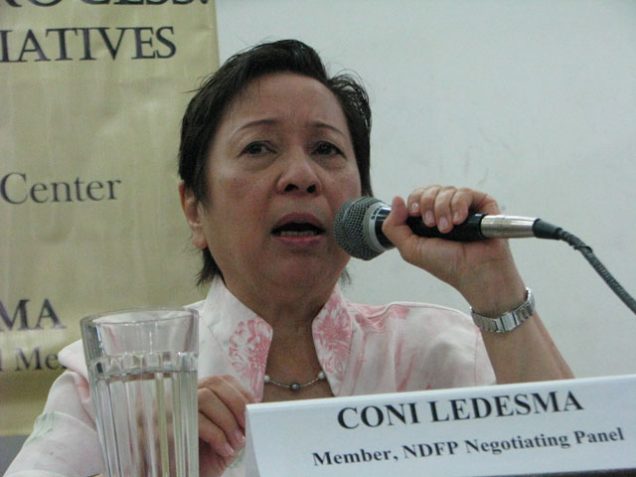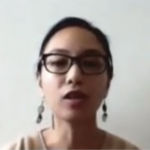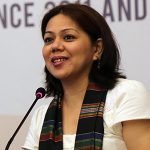Online forum addresses Filipino women’s issues under Duterte
Online forum addresses Filipino women’s issues under Duterte
International Women’s Day
By Lea Luciano
Last Saturday, March 6, 2021, Migrante Alberta organized an online forum and panel discussion in honour of International Women’s Day to commemorate the day and expose the current issues facing Filipino women in the Philippines under the Duterte administration.
The virtual event was co-hosted by Women for Rights and Empowerment in Alberta and was attended by 113 participants.

Coni Ledesma, a member of the negotiating panel of the NDFP and MAKIBAKA representative
Coni Ledesma, a member of the negotiating panel of the National Democratic Front of the Philippines (NDFP) and the national representative of MAKIBAKA, a women’s organization and allied member of the NDFP, spoke about the rich history and the women at the forefront of the struggle for change behind the celebration of International Women’s Day.
“Our yearly March 8 celebrations throughout the world unite us with our foremothers, who gave us international working Women’s Day, to salute all of us women who have stood up and are still standing up and fighting for our rights,” she said.
She added, “If the women workers didn’t strike, if they didn’t take action, the factory workers will not change the inhumane working conditions. Their daringness and courage brought about change.”
She noted that the involvement of women in the revolutionary struggle throughout the years has grown tremendously. The formation of Gabriela in the Philippines during the 80s has brought great awareness among women of their exploitation and the need to resist, organize and mobilize.
“We are women. We are strong. The struggle has made me strong. That is a wonderful thing that happens to us when we struggle. We change little by little, we liberate ourselves and live our lives not only for ourselves but in the service of the people. Struggle liberates us,” said Ledesma.

Joanna Concepcion, the chairperson for Migrante International
Joanna Concepcion, the chairperson for Migrante International, is a longtime migrants activist and advocate. She now leads the biggest Global Alliance of Filipino migrant organizations. Migrante International has over 200 member organizations in over 100 countries.
Concepcion talked about the plight of Filipino migrant women workers under the Duterte administration and the commodification of migrant workers, especially during the pandemic.
“Filipino women migrants continue to suffer from inhumane forms of exploitation, human trafficking and illegal recruitment abroad, especially those who are undocumented,” she said.
The Duterte administration has failed to safeguard the Filipino people and migrant workers from the COVID-19 health crises. One of the most harmful aspects of the Philippine government’s long-standing labour export policy is the barbaric and degrading treatment of Filipino women migrant workers, she noted.
“Most recently, Filipino healthcare workers were being used as a bargaining chip for COVID vaccines and the Department of Labor offered the government of the United Kingdom & Germany more Filipino healthcare workers in exchange for 600,000 COVID vaccines,” said Concepcion.
“Filipino migrant workers demand immediate financial aid and livelihood support, free social services, local employment with job security, higher wages and pro-labour policies, not a labour export policy that has proven to not end the cycle of poverty and underdevelopment in our country,” Concepcion added.
Concepcion added, “Unless the Philippine government genuinely addresses the problem of forced migration, prioritize economic policies that focus on national industrialization and genuine land reform to create long term jobs, provide free and comprehensive basic social services such as education and health care, there will be a chronic cycle of Filipino migrant workers leaving the country each year new items.”

Beverly Longid, Global
Coordinator of the IPMSDL
Beverly Longid drew parallel towards the situation of the Indigenous People in the Philippines and Canada in terms of their struggle when it comes to defending their territory, their roles, and vicious attacks of their people and their land.
Longid spoke about the criminalization of any forms of dissent against the government, and suspects activists, human rights advocates, or anyone critical of its programs and policies.
“It embarks in a national communist witch hunt, making no distinction between civilians and armed combatants,” she said.
Previous military reports state that 90 per cent of guerilla bases are located in ancestral domains of Indigenous People, and their communities are labelled as red areas, rebel-controlled, or communist infested.
Longid is an Indigenous woman from the Mountain Province in the Philippines, and she is the Global Coordinator of the International Indigenous Peoples Movement for Self Determination and Liberation (IPMSDL).
“We remain steadfast in our work of building and strengthening our organizations and asserting our rights despite the attacks against us. And the limitations brought by COVID-19,” said Longid.
“We continue our campaign to defend the Cordillera, to free the Lumad 26 and to flee the Aetas and also to call for justice for the victims of the Tumandok massacre and arrest. Overcoming these challenges necessitates your support and solidarity as we move to promote human rights over tyranny.”

Clarizza Singson, Chairperson of Gabriela Negros Island
Clarizza Singson, Chairperson of Gabriela Negros Island is the chairperson of Gabriella Negros Island in the Philippines spoke about the situation of the criminalization of dissent and red-tagging of activists and human rights advocates in the Philippines.
“I came from an island Negros in the Philippines, where grave exploitation and oppression is happening each and every day. The history of resistance of the people resulted to an intense militarization of the whole island and making it as one of the top priority when it comes to the counter-insurgency program of the Duterte Government,” Singson said.
The Center for Women’s Resources (CWR) recorded 27 incidents of arrest with 54 women rights defenders between January 2020 until February 21, 2020, including pregnant women and nursing mothers such as Amanda Echanis — a peasant organizer and daughter of slain activist Randall “Randy” Echanis, Singson noted.
“Our faces were being posted in public places and death threats keep coming every day,” she said. “All those red-tagging, death threats, and harassment and all those liquidation lists were not empty threats. They really pose danger to the lives of the human rights defenders and leaders of individuals, leaders of people’s organizations who are being red-tagged and harassed.”
———————-
 Lea Luciano is a freelance photographer, journalist and researcher from Edmonton, Alberta. She is an honor journalism graduate from Southern Alberta Institute of Technology.
Lea Luciano is a freelance photographer, journalist and researcher from Edmonton, Alberta. She is an honor journalism graduate from Southern Alberta Institute of Technology.
Comments (0)